Paris isn’t just about cafés and croissants after dark
When the sun sets, Paris transforms. The city doesn’t just switch on lights-it switches on sounds. From smoky jazz cellars tucked into Montmartre alleys to underground electro warehouses beneath the Seine, the nightlife here doesn’t follow trends. It sets them. If you think Paris nightlife means fancy cocktails and quiet wine bars, you’re missing half the story.
Where jazz still breathes like it did in the 1950s
Le Caveau de la Huchette isn’t just a club. It’s a time machine. Since 1947, this basement venue near Notre-Dame has hosted live jazz seven nights a week. No fancy decor. No Instagram filters. Just sweat, brass, and a rhythm that pulls you in before you even sit down. The band plays straight-ahead swing, bebop, and blues-no remixes, no backing tracks. You’ll hear the same songs that Miles Davis and Ella Fitzgerald once played here. Locals come for the music. Tourists come for the vibe. Both leave with ringing ears and a full heart.
Don’t miss New Morning in the 10th arrondissement. It’s smaller than a theater but louder than a stadium. Regulars know to arrive early-seats vanish fast. The lineup changes weekly, but you’ll almost always find a French jazz legend sharing the stage with a rising star from Senegal or Brazil. This isn’t background music. It’s a conversation between instruments, and you’re invited.
Electro isn’t just a genre here-it’s a movement
Paris has one of Europe’s most active underground electro scenes, and it’s not in the Marais. It’s in the 13th, in forgotten industrial spaces, behind unmarked doors, and down staircases that feel like they lead to another dimension. La Machine du Moulin Rouge isn’t the cabaret you think it is. It’s a warehouse converted into a sound temple, where DJs spin hypnotic techno and acid house until 6 a.m. The crowd? Designers, coders, students, retirees-all united by the beat.
At Le Trianon, the bass hits your chest before you see the lights. This isn’t a club for partying. It’s for feeling. The sound system was custom-built by French engineers who studied Berlin’s Berghain. No VIP sections. No bottle service. Just a dark room, a wall of speakers, and a crowd moving as one. If you’ve ever wondered what Paris sounds like when it’s truly alive, this is it.

Where jazz meets electro-and nobody asks for permission
The most exciting nights in Paris happen when genres collide. At Le Trianon, you might hear a saxophone solo layered over a four-on-the-floor beat. At La Bellevilloise, a DJ spins vintage Roland TR-808 tracks while a live percussionist taps out rhythms on wine bottles and metal pipes. These aren’t gimmicks. They’re experiments that work.
Try Le Baron on a Thursday. It’s not the cheapest spot, but it’s the most unpredictable. One night, a jazz quartet opens for a French electro producer who samples Charlie Parker. The next, a spoken-word poet performs over a glitchy ambient track. The crowd doesn’t care about labels. They care about energy. If you want to see how Paris’s music scene is evolving, this is where you need to be.
What to expect when you go out
Paris nightlife doesn’t run on American hours. Dinner starts at 9 p.m. Clubs don’t fill up until midnight. And most places don’t even open until 11. Don’t show up at 9:30 expecting a packed room. You’ll just be the first one there, sipping a cheap red wine and watching the bouncer adjust the lights.
Most venues have a dress code, but it’s not about being fancy. It’s about being respectful. No flip-flops. No athletic wear. A simple black shirt and jeans work everywhere. Cover your shoulders if you’re heading into a jazz club-some still have old-school rules.
Payment? Cash is still king. Even if the sign says “card accepted,” the machine might be broken. Always carry €20-€30. Bouncers don’t care if you’re from New York or Nairobi. They care if you have the right vibe. And the right cash.

Hidden gems most tourists never find
Forget the guidebooks. The best spots aren’t on Google Maps.
- Le Petit Journal Montparnasse-a tiny bar with no sign, just a red door. Inside, a pianist plays Gershwin while patrons sip absinthe from thimbles. Only open on Tuesdays.
- La Station-a former train station turned into a multi-room sound lab. One room plays free jazz. Another plays Detroit techno. The third? Silence, with a single speaker playing field recordings of Paris rain.
- Le Chien de la Rue-a basement bar under a laundromat in the 11th. No menu. Just a chalkboard: “Tonight: Jazz + Bass.” The owner brings in musicians from Senegal, Mali, and Martinique. You pay what you feel.
When to go and how to plan
Weekends are crowded. If you want space to move, go midweek. Tuesdays and Wednesdays are when locals go out-no tourists, no lines, better music.
Check Paris Jazz Club’s website for weekly lineups. Or follow @ParisNights on Instagram. They post last-minute gigs, pop-ups, and secret locations. Don’t wait for official announcements. The best shows are announced 24 hours in advance.
Arrive early. Stay late. Leave when your feet hurt. That’s the Paris rule.
Why this matters
Paris nightlife isn’t about drinking. It’s about listening. About being part of something that’s been alive for decades. Jazz here isn’t nostalgia-it’s living history. Electro isn’t a trend-it’s a rebellion. And the spaces between them? That’s where the real magic happens.
You don’t need to know the difference between swing and house. You just need to show up. Let the music decide what you feel. That’s how Paris works. And that’s why people keep coming back.
What’s the best night to experience jazz in Paris?
Tuesday and Wednesday nights are the quietest and most authentic. Clubs like Le Caveau de la Huchette and New Morning often feature local legends who don’t play weekends. Tourists are gone, the crowd is real, and the music is pure.
Are Paris nightclubs safe for solo travelers?
Yes, especially jazz clubs and underground venues. The scene is tight-knit. Bouncers know regulars. Women travel alone here often. Avoid isolated areas after 2 a.m., but inside most clubs, you’ll feel safe. Stick to well-known spots like Le Trianon, La Bellevilloise, or New Morning.
Do I need to book tickets in advance?
For big names or weekend shows at New Morning or Le Trianon, yes. For smaller clubs like Le Petit Journal or Le Chien de la Rue, just show up. Most places don’t take reservations. Walk-ins are welcome, and the best moments happen when you don’t plan.
Is there a difference between Paris and Berlin nightlife?
Berlin is about endurance-long sets, minimal lighting, industrial spaces. Paris is about intimacy and surprise. A jazz trio might play next to a DJ spinning French house. The energy is more emotional, less mechanical. You don’t just dance in Paris-you connect.
Can I find English-speaking staff in Paris clubs?
In tourist-heavy spots like Le Baron or Le Trianon, yes. But in hidden gems like Le Petit Journal or La Station, staff might speak little English. Don’t worry. Music doesn’t need translation. A nod, a smile, and a point at the menu will get you far.




